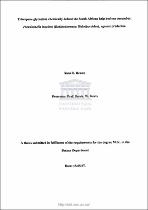| dc.contributor.advisor | Keats, D.W | |
| dc.contributor.author | Brown, R.E | |
| dc.date.accessioned | 2023-06-14T15:21:36Z | |
| dc.date.available | 2023-06-14T15:21:36Z | |
| dc.date.issued | 1997 | |
| dc.identifier.uri | http://hdl.handle.net/11394/10250 | |
| dc.description | >Magister Scientiae - MSc | en_US |
| dc.description.abstract | The small, subtidal sea cucumber, Pseudocnella insolens appears to have
no obvious protection from predation, yet it occurs in dense colonies covering rocky areas
and appears to have few predators. Laboratory-based feeding rials were developed to
assess the deterrent effects of various purified sea cucumber extract | en_US |
| dc.language.iso | en | en_US |
| dc.publisher | University of the Western Cape | en_US |
| dc.subject | Triterpene glycosides | en_US |
| dc.subject | chemically | en_US |
| dc.subject | kelp bed | en_US |
| dc.subject | sea cucumber | en_US |
| dc.subject | Pseudocnella insolens | en_US |
| dc.title | Triterpene glycosides chemically defend the south african kelp bed sea cucumber, Pseudocnella insolens (echinodermata : holothu roidea), against predation. | en_US |
| dc.rights.holder | University of the Western Cape | en_US |

